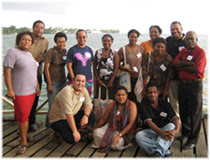Vinaka to Makareta for sharing the joint position of Commonwealth countries on climate change (click 'Read More'), and welcome home from Uganda!
Makareta reports, "Pacific Islands & Caribbean nations present at the Commonwealth Heads of Goverment Meeting (CHOGM) were satisfied that some committments were made by the more developed memebrs of CHOGM to climate change, especially with the change of government in Australia."
LAKE VICTORIA CLIMATE CHANGE ACTION PLAN
We, the Heads of Government of the Commonwealth, are gravely concerned about the threat that climate change represents to human security and economic wellbeing.
2 We reaffirm our continued commitment to the 1989 Langkawi Declaration on the Environment when Commonwealth Heads of Government first defined our collective concern, concluding that:
· Serious deterioration of the environment is a threat to the well-being of current and future generations;
· Delay in halting environmental degradation will result in permanent and irreversible damage;
· Threats to the environment need to be viewed and addressed in a balanced perspective, mindful of the needs to eradicate poverty, provide sustainable development, and enhanced quality of life for all;
· Most environmental problems transcend national boundaries, and therefore require solutions that are mutually reinforcing at global, regional, national and community levels; and,
· Solutions to today’s environmental challenges also require active participation by all.
3 We are conscious that climate change is a direct threat to the very survival of some Commonwealth countries, notably small island states. We are also conscious of the threat to low-lying coastal regions. Climate change can undermine our continuing efforts to achieve the Millennium Development Goals. We recognize that the cost of inaction on mitigation and adaptation is far greater than the cost of early action.
4 We believe that the diversity of the Commonwealth places our association in a unique position to support the pursuit of ambitious solutions, particularly through our unqualified support for work through the United Nations Framework Convention on Climate Change (UNFCCC) to reach an agreement on collective, comprehensive and global action.
5 Our Commonwealth diversity also underscores the importance of common but differentiated responsibilities; recognition of the respective capabilities of states, especially the constraints faced by least developed and developing countries; and the importance of developed countries taking the lead. Burden sharing should be equitable, should not perpetuate poverty, and should be compatible with accelerated development.
6 We call for increased financial flows for adaptation, and their improved effectiveness. We urge additional incentives for developing countries, in particular through flexibility mechanisms, for commitments to enhanced mitigation action. Carbon trading will be important in this regard.
7 We recognise the need to overcome technical, economic and policy barriers to facilitate the development, diffusion and deployment of affordable low- and zero-emission technologies and renewable energy. We also recognise the need for energy efficiency and conservation.
8 We firmly believe that no strategy or actions to deal with climate change should have the effect of depriving developing countries of the possibility of sustainable economic development. On the contrary, measures to tackle the impacts of climate change should support the positive economic and social transformation of societies. In particular, the easing of population pressure on agricultural land and the successful development of secondary and tertiary sectors in economies requires the provision of clean energy.
9 We believe that development itself is an important tool in addressing climate change, since a well educated and healthy society, with a diverse economy, is best placed to be flexible and to generate the necessary resources to invest in cleaner technologies and systems, and to fund adaptation measures.
10 Effective action will only be possible with the willing support of the Commonwealth population as a whole, including women and young people. We invite the family of Commonwealth organisations to play a full part in promoting a better understanding of climate change and its impacts, and in addressing adaptation and mitigation challenges.
11 Accordingly, we are resolved, individually and collectively, to pursue active participation through the United Nations Framework Convention on Climate Change (UNFCCC), caucusing together and leveraging from our shared vision and diversity to the fullest extent possible. These negotiations should be inclusive in nature and should work towards outcomes that are ambitious, comprehensive, equitable, have respect for different national circumstances, and provide for flexibility in addressing climate change. Our shared goal should be to achieve a comprehensive post-2012 global agreement that strengthens, broadens, and deepens current arrangements and leads to reduced emissions of global greenhouse gases. This should include a long term aspirational global goal for emissions reduction to which all countries would contribute.
12 We are also resolved, individually and collectively, to pursue the following actions, which should also inform our positions at Bali:
(i) Pursuit of initiatives to strengthen the quality and participation levels at international negotiations on climate change, such as assisting Commonwealth developing countries with their national negotiating capacity.
(ii) Promotion of Commonwealth work, drawing on our networks of professional associations and other resources, to strengthen consideration of the human and economic aspects of climate change.
(ii) Support for improved land use management, including conservation and sustainable use of forest resources. This should comprise market-based mechanisms and compensatory measures for the preservation of standing forests; provisions for reforestation and afforestation; and measures to combat illegal logging and other causes of deforestation. In this regard, the Commonwealth’s commitment to the Iwokrama Rainforest Programme is renewed and efforts should continue to be pursued to widen international knowledge and support of it.
(iv) Work to study and make recommendations on issues related to the sustainability of fresh agricultural produce in respect of transported exports, particularly from developing countries, with a view to securing more sound information on carbon footprints related to the export of fresh produce.
(v) Renewed efforts to support natural disaster management in member countries. This should include further consideration of insurance proposals for small island states, including those of the Commonwealth Disaster Management Agency, while the Commonwealth Secretariat should continue its work to strengthen natural disaster management in member countries in conjunction with other international efforts.
(vi) The provision of technical assistance and other support, particularly to least developed countries and vulnerable small states, to assess the implications of climate change and the benefits of building adaptation into all aspects of national planning and budgeting, wherever feasible and practical.
13 We are resolved that Commonwealth governments and the Commonwealth Secretariat will play their full part to implement our shared goals and envisaged actions, working in strategic partnership and conjunction with other international institutions, raising awareness, facilitating access, and sharing best practice. Our governments will contribute additional technical and financial support according to our means.
Read more!










